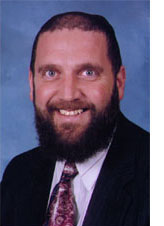By Rabbi Baruch Lederman

SAN DIEGO–Rabbi Yosef Charif of Slonim was known for his sharpness and insight. Every year as Pesach approached, he received a multitude of queries concerning the intricate laws of the
holiday. One year, he received a distressed looking woman on Erev Pesach morning, asking for an audience with the Rabbi. The Rabbi ushered her into his study.
The woman was none other than the wife of R’ Nota Hirsch. R’ Nota was a successful businessman and a prominent active member of the Jewish community. He was one of the biggest philanthropists in the entire region.
“Rabbi,” she began, “I am at my wits end. My husband has suffered severe business setbacks that have wiped him out. He has no money left – not a one cent.”
“I am so sorry to hear this,” responded Rabbi Charif, “I didn’t know a thing about it.”
“That’s just it,” she explained, “He is too humiliated to let anyone know. For years, we have always had the pleasure of contributing generously to the mitzvah of Maos Chittim (Passover food for the needy), and now I do not even have the ability to provide for our own Pesach – and the first Seder is tonight. I do not know what to do, I cannot ask anyone for help – my husband’s pride would be devastated. I didn’t even tell him that I was coming here.”
The Rabbi mulled over the problem for a few moments and came up with an idea, “Tell your husband that tonight in shul, when he greets me after services, he should whisper in my ear.”
“Why should he do that?”
“You must trust me and do as I say. Make sure he whispers in my ear.”
That night, the synagogue was packed with people, all dressed in their YomTov (holiday) finery. Everyone was radiant with happiness and holiday spirit, looking forward to the Seder they would enjoy at home with their families that evening. As was customary, each went up to the front to personally greet the Rabbi.
When R’ Nota Hirsch went up to greet the Rabbi, he followed his wife’s instructions (though neither he nor she had any idea why), and whispered into the Rabbi’s ear, “Gut YomTov (happy holiday) Rabbi. Happy Pesach.”
Upon hearing this, the Rabbi jumped up and said in a loud voice, “Oy vey! I am so sorry to tell you this. It is all chometz (not kosher for Passover). It is all chometz!”
Everyone in the shul heard this and assumed that R’ Nota was describing some accidental occurrence that took place in their kitchen, and asking the Rabbi to rule whether or not it
was kosher. Immediately one of the onlookers said, “Don’t worry R’ Nota, I have extra matzo in my house, I will bring you over some so that at least you will have matzo for the Seder.” Another piped up, “We have extra wine, I will bring some over so you can drink the Four Cups.” Another man chimed, “My wife made plenty of extra chicken soup, we will bring you over some for the Seder meal.”
Word of the “kashrus accident” spread throughout the town. There was literally a stream of people coming throughout the night, each bringing a dish or two, from fish to salad to soup to honey cake. By the time the night was over, they had enough food for a week. Thanks to the Rabbi’s wisdom and sensitivity, no one knew or even suspected anything about the family’s severe financial straits.
In the coming months, things turned around completely. By the next Pesach, R’ Nota Hirsch was restored to his original wealth – only now, he was even more grateful to Hashem (G-d) and more philanthropic than ever.
Dedicated anonymously on the occasion of the 2nd Yahrtzeit of the Rosh Yeshiva ztl, Moreinu V’Rabbeinu HoRav Alter Chanoch Henoch HaKohain Leibowitz.
*
Rabbi Lederman is spiritual leader of Congregation Kehillas Torah in San Diego.